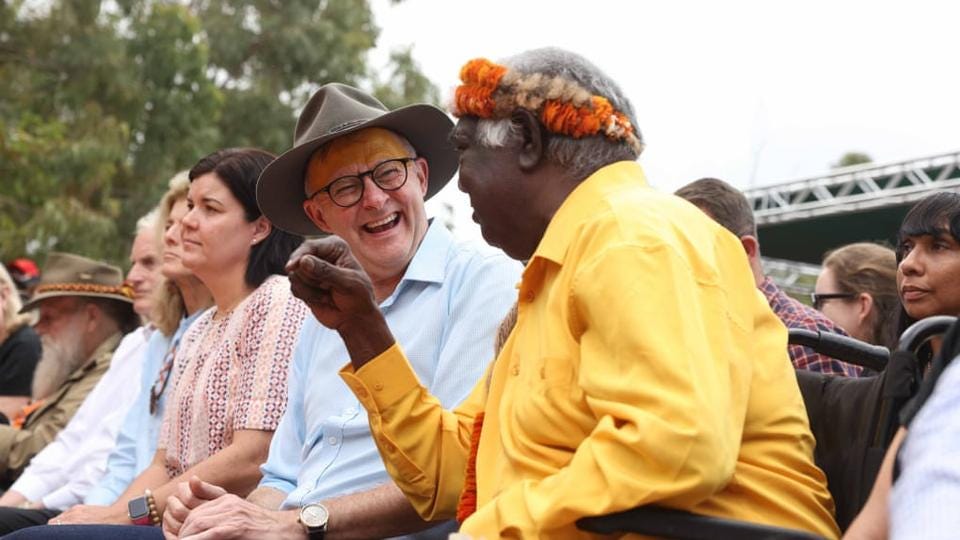Anthony Albanese has always prided himself as a man of the people - an all-round good knock about bloke.
The boy made good from humble beginnings, where life growing up in a single parent-home in the housing commission flats of Sydney’s inner-western suburb of Camperdown was tough.
.
Growing up poor with a mother suffering from chronic rheumatoid arthritis and believing his father had died in a car accident, as his mother had told him he had, would have made life extremely difficult for the PM.
One can only suspect, the Prime Minister, would have shouldered great responsibility as an only child to help ease the burden of care on his mother.
Understanding the PM’s background should give Australians insight into why the “Voice to Parliament” getting up is important to the PM.
His impoverished childhood makes him aware better than most, the challenges Indigenous Australians living in poverty face.
And his housing policy initiative alone further reinforces the PM’s thinking and desire to make life better for underprivileged Australians.
Albo’s social and moral obligations to ‘do the right thing’ is a window into his decency – qualities many other Prime Ministers lacked?
The Prime Minister should be applauded for caring, but governing means being for all Australians – not just a select group where policy being introduced lacks clarity around Zzqits intent or what it genuinely delivers to the country.
The proposed "Voice to Parliament" initiative has been a central focus for many Australians.
With any major policy proposal, its implications are far-reaching and carry the potential to reshape Australia's political landscape.
However, the complexities and ambiguities surrounding this proposal have left many Australians uncertain about its true impact.
When faced with uncertainty, it might be in the best interest of the nation for Australians to vote "No".
Democracy thrives when Australians make decisions based on comprehensive information and understanding.
Voting "Yes" without a clear idea of the proposal's repercussions could inadvertently usher in changes that might not serve Australia’s broader community well.
In the absence of clarity, a "No" vote acts as a safeguard against potential unforeseen challenges.
Every policy, no matter how well-intentioned, carries with it the potential for unintended consequences.
Without a full understanding of the "Voice to Parliament" and its long-term implications, Australians risk supporting a proposal that could have adverse effects on the nation's unity, governance, or social fabric.
Which is why its paramount to ensure any change, especially one of such magnitude, is well-understood before it's endorsed.
If a significant portion of Australia’s population continues to remain unclear about a proposal, it raises questions about the effectiveness of its communication campaign.
A "No" vote, in this context, can serve as feedback for the need for better communications and clarity from those who have been championing the cause.
The goal of the "Voice to Parliament" is ostensibly to provide Indigenous communities with a more significant say in the nation's affairs.
However, if its structure, function, and implications remain muddled for many Australians, there's no guarantee it will genuinely serve the interests of these communities.
Voting "No" in the face of uncertainty might offer an opportunity for a more refined and transparent proposal in the future.
For a proposal of this magnitude, it's crucial for every voter to have access to comprehensive, unbiased, and easy-to-understand information.
If a gap remains in understanding, it could be indicative of an information shortfall. Until there is more transparency and comprehensive dissemination of details, voting "No" acts as a precautionary measure.
Australia's strength lies in its unity and the shared vision of its diverse populace. Initiatives that carry the potential to reshape the political or social landscape should be approached with caution and widespread understanding.
Without a clear consensus, pushing ahead with such meaningful change might risk fragmenting Australia's cohesion.
A "No" vote today does not close the door on the “Voice to Parliament” initiative.
It can be seen as an opportunity for proponents to refine their proposal, offer clearer explanations, and ensure that when reintroduced, it has the widespread understanding and support of the Australian populace.
The PM’s strong advocacy for the "Voice to Parliament" carries noble intentions of ensuring representation and justice for Indigenous communities.
But its true implications need to be clearly understood by all Australians to ensure it brings about genuine positive change without adverse effects.
Its important people recognise the goal of “Voice to Parliament” is to ensure just and effective representation for Indigenous communities.
If there's uncertainty surrounding the proposal, it's crucial to question if it genuinely serves Indigenous interests.
Voting "No" could potentially pave the way for a more comprehensive, well-understood, and inclusive proposal in the future.
Voting "No" in an overwhelming current climate of uncertainty may not be a rejection of the initiative but a call for clarity and understanding.
"It's better to be safe than sorry," especially when the stakes are so high.





Well said Wendy and thank you. There continues to be strong uncertainty and confusion about the 'Voice to Parliament' and what its intent is, and what it's trying to achieve and for whom. It's for that reason, if people are uncertain, then they have no option but to err on the side of caution and vote no until convinced otherwise as to why their vote should be a yes, and the government has failed to do so.
Yes I can check into it.